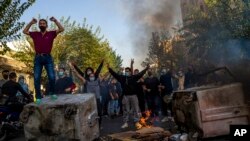An Iranian in his early 20s who was executed in a case connected to the 2022 protests has been buried amid a heavy security force presence, a rights group said on Friday.
Milad Zohrevand, who was executed at dawn on Thursday in a prison in the western city of Hamadan, is the eighth convict to have been executed over the protests that shook Iran starting in September last year.
The protests erupted after the death in police custody of Mahsa Amini, a young Iranian Kurd who had been arrested for allegedly violating Iran's strict dress rules for women.
Zohrevand was buried in Hamadan with 20 family members present, the Norway-based Hengaw Organization for Human Rights said.
He had been sentenced to death in the killing of a Revolutionary Guards officer during a protest in the town of Malayer in November last year. Rights groups have said he was not given a fair trial.
Hengaw said the Revolutionary Guards had not allowed the family to transfer his body to his hometown of Malayer, insisting that the funeral take place in the provincial capital, Hamadan, instead.
Hengaw, which focuses on Kurdish issues, said that Zohrevand's execution was carried out in secret. He had received notification that his execution was imminent and was not granted a final meeting with his family.
The execution of Zohrevand has not been reported by media inside Iran.
The German foreign ministry condemned the execution, saying in a statement on X, formerly Twitter, that "demonstrating against injustice is a fundamental right and not a crime."
Iran had executed seven more men in cases related to the 2022 protests. The last such executions related to the protests were of three men in May.
"Like the execution of other protesters, Milad Zohrevand's execution without due process or a fair trial is a criminal act and Islamic republic authorities must be held accountable for this crime," said Oslo-based Iran Human Rights director Mahmood Amiry-Moghaddam.
Iran launched a sweeping crackdown to snuff out the protests that saw hundreds killed and thousands arrested, according to rights groups and the United Nations.
Iran has executed at least 684 people this year, mostly on murder and drug-related charges, according to Iran Human Rights. Germany warned that "Iran is executing more people than it has for a long time."
Amiry-Moghaddam said Iran had paused protest-related executions for some months because of "the strong international backlash."
He warned that the international community's relative silence in the face of other executions in recent months had emboldened Iran to "resume protester executions."




